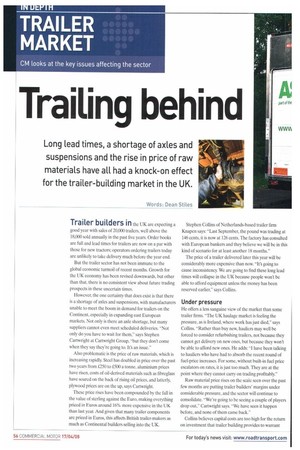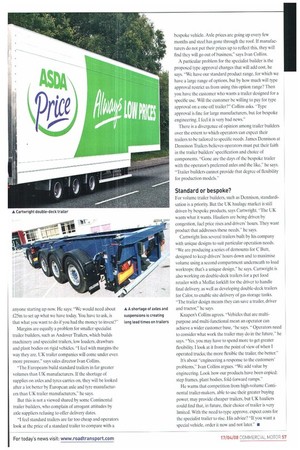Trailing behind
Page 56

Page 57

If you've noticed an error in this article please click here to report it so we can fix it.
Long lead times, a shortage of axles and suspensions and the rise in price of raw materials have all had a knock-on effect for the trailer-building market in the UK.
Words: Dean Stites Trailer builders in the UK are expecting a good year with sales of 20,000 trailers, well above the 18,000 sold annually in the past five years. Order books are full and lead times for trailers are now on a par with those for new tractors; operators ordering trailers today are unlikely to take delivery much before the year end.
But the trailer sector has not been immune to the global economic turmoil of recent months. Growth for the UK economy has been revised downwards, but other than that, there is no consistent view about future trading prospects in these uncertain times.
However, the one certainty that does exist is that there is a shortage of axles and suspensions, with manufacturers unable to meet the boom in demand for trailers on the Continent, especially in expanding east European markets. Not only is there an axle shortage, but many suppliers cannot even meet scheduled deliveries. "Not only do you have to wait for them," says Stephen Cartwright at Cartwright Group, "but they don't come when they say they're going to. It's an issue."
Also problematic is the price of raw materials, which is increasing rapidly. Steel has doubled in price over the past two years from £250 to £500 a tonne, aluminium prices have risen, costs of oil-derived materials such as fibreglass have soared on the back of rising oil prices, and latterly, plywood prices are on the up, says Cartwright.
These price rises have been compounded by the fall in the value of sterling against the Euro, making everything priced in Euros around 16% more expensive in the UK than last year. And given that many trailer components are priced in Euros, this affects British trailer-makers as much as Continental builders selling into the UK. Stephen Collins of Netherlands-based trailer firm Knapen says: "Last September, the pound was trading at 146 cents, it is now at 126 cents. The factory has consulted with European bankers and they believe we will be in this kind of scenario for at least another 18 months."
The price of a trailer delivered later this year will be considerably more expensive than now. "It's going to cause inconsistency. We are going to find these long lead times will collapse in the UK because people won't be able to afford equipment unless the money has been reserved earlier," says Collins.
Under pressure He offers a less sanguine view of the market than some trailer firms. "The UK haulage market is feeling the pressure, as is Ireland, where work has just died," says Collins. "Rather than buy new, hauliers may well be forced to consider refurbishing trailers, not because they cannot get delivery on new ones, but because they won't be able to afford new ones. He adds: "I have been talking to hauliers who have had to absorb the recent round of fuel-price increases. For some, without built-in fuel price escalators, on rates, it is just too much. They are at the point where they cannot carry on trading profitably."
Raw material price rises on the scale seen over the past few months are putting trailer builders' margins under considerable pressure, and the sector will continue to consolidate. "We're going to be seeing a couple of players drop out," Cartwright says. "We have seen it happen before, and none of them came back.
Collins believes capital costs are too high for the return on investment that trailer building provides to warrant anyone starting up now. He says: "We would need about £25m to set up what we have today. You have to ask, is that what you want to do if you had the money to invest?"
Margins are equally a problem for smaller specialist trailer builders, such as Andover Trailers, which builds machinery and specialist trailers, low loaders, drawbars and plant bodies on rigid vehicles. "I feel with margins the way they are, UK trailer companies will come under even more pressure," says sales director Ivan Collins.
"The Europeans build standard trailers in far greater volumes than UK manufacturers. If the shortage of supplies on axles and tyres carries on, they will be looked after a lot better by European axle and tyre manufacturers than UK trailer manufacturers," he says.
But this is not a viewed shared by some Continental trailer builders, who complain of arrogant attitudes by axle suppliers refusing to offer delivery dates.
"I feel standard trailers are far too cheap and operators look at the price of a standard trailer to compare with a bespoke vehicle. Axle prices are going up every few months and steel has gone through the roof. If manufacturers do not put their prices up to reflect this, they will find they will go out of business," says Ivan Collins.
A particular problem for the specialist builder is the proposed type approval changes that will add cost, he says. "We have our standard product range, for which we have a large range of options, but by how much will type approval restrict us from using this option range? Then you have the customer who wants a trailer designed for a specific use. Will the customer be willing to pay for type approval on a one-off trailer?" Collins asks. "Type approval is fine for large manufacturers, but for bespoke engineering, I feel it is very bad news."
There is a divergence of opinion among trailer builders over the extent to which operators can expect their trailers to be tailored to specific needs. James Dennison at Dennison Trailers believes operators must put their faith in the trailer builders' specification and choice of components. "Gone are the days of the bespoke trailer with the operator's preferred axles and the like," he says. "Trailer builders cannot provide that degree of flexibility for production models."
Standard or bespoke?
For volume trailer builders, such as Dennison, standardisation is a priority. But the UK haulage market is still driven by bespoke products, says Cartwright. "The UK wants what it wants. Hauliers are being driven by congestion, fuel price rises and drivers' hours. They want product that addresses these needs," he says.
Cartwright lists several trailers built by his company with unique designs to suit particular operation needs. "We are producing a series of demounis for C Butt, designed to keep drivers' hours down and to maximise volume using a second compartment underneath to load worktops: that's a unique design," he says. Cartwright is also working on double-deck trailers for a pet food retailer with a Moffat forklift for the driver to handle final delivery, as well as developing double-deck trailers for Color, to enable site delivery of gas storage tanks. "The trailer design means they can save a trailer, driver and tractor," he says.
Knapen's Collins agrees. "Vehicles that are multipurpose and multi-functional mean an operator can achieve a wider customer base, -he says. " Operators need to consider what work the trailer may do in the future," he says. "Yes, you may have to spend more to get greater flexibility. I look at it from the point of view of when I operated trucks; the more flexible the trailer, the better."
It's about "engineering a response to the customers' problems," Ivan Collins argues. -We add value by engineering. Look how our products have been copied: step frames, plant bodies, fold-forward ramps."
He warns that competition from high-volume Continental trailer-makers, able to use their greater buying power, may provide cheaper trailers, but UK hauliers could find that, in future, their choice of trailer is very limited. With the need to type approve, expect costs for the specialist trailer to rise. His advice? "If you want a special vehicle, order it now and not later." •




























































































































































































